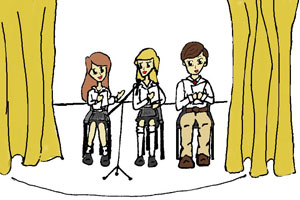For the first time ever, the library staff has been able to make the summer reading program more enjoyable for everyone by coming up with a list of choices of books for students to read over the summer. That’s right. Choices.
Letting the students pick which book they want to read is the best and most notable change that the administration has made to the summer reading program. Though there will be less unity with three choices of books for students to choose to read, as a whole, this will make summer reading more pleasurable for everyone.
The types of books that were chosen were also well thought out. With a nonfiction book about an out of body experience, a fiction story told from the point of view of a dog, and a unique murder mystery novel, there’s something for everyone. The Patriot reviewed each of these books, which can be found here: “Heaven is for Real,” “The Art of Racing in the Rain,” “The Curious Incident of the Dog in the Night Time.”
Having students involved in the summer reading book decision also helped to select books that would be more appealing to the student body. Hopefully next year, though, more students will want to be involved in the process than the minute representation that helped make this year’s decision.
This year, there was also a new, successful way that the books were introduced to the student body. Students could get a feel for the three books by having members of the Speech and Debate team read passages from each of them. This, along with emailing students descriptions of each of the books, allowed students to better evaluate which book they would like to read.
Principal Madelyn Ball also decided that summer reading will be counted as a pass or fail course at the beginning of next school year. In the past, summer reading assignments have been given, but they’ve fallen by the wayside when it comes to being graded. By having one single, separate grade, this will provide students with an incentive to do the reading and whatever assignment comes with it.
One thing that could be improved upon is the finality of choosing a book. Before summer even starts, students have to identify which book they want to read. If they don’t, they will be assigned a book. A student might start reading a book and decide that he or she would prefer one of the others, but his or her choice would already be locked in. This defeats some of the purpose of the choice.
To get a count for which students read which book, students should fill out a survey after summer when they come back to school, which provides more room for change.
As a whole, the changes that have been made to the summer reading program are positive, and should hopefully improve student participation and excitement for the summer reading program.
Brianna Glase is a Managing Editor for The Patriot and jcpatriot.com.



